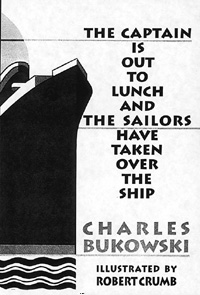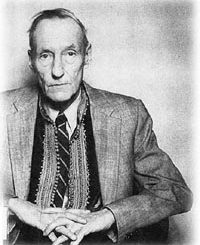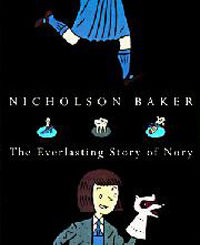 The Captain Is Out To Lunch And The Sailors Have Taken Over The Ship
The Captain Is Out To Lunch And The Sailors Have Taken Over The Ship
by Charles Bukowski. Illustrated by Robert Crumb
(Black Sparrow Press 144 pp.)
by Thomas Christian
I must confess outright to Ignorance Absolute in matters related to Charles Bukowski. I was originally blinded by misguided assumptions (the skull that cast He in the role of Old Drunken California Bum), and humb-ily do recognize the talent that was (in a flurry of apologies), albeit in the aftermath of his passing. A feat he clairvoyantly pontificated upon His Very Self in a newly issued Black Sparrow volume, writing: “One day, they’ll say, ‘Bukowski is dead,’ and then I will truly be discovered.”
These posthumously published diaries document the period between August 1991 and February 1993, Bukowski’s voice leading a screaming charge from beyond the grave: “So what? Immortality is the stupid invention of the living.” While scripting these journals however, during his 8th decade on the planet, it is his own mortal shell that stares back in the mirror’s reflection, contradicting his crotchety-hood, and resulting in a gaggle of simultaneously expurgating ridicules and admirations; insults and little pleasures. Delivering inspiration to the squatters of the Cynical World, he serves as catalyst of courage, relaxing the fear, and offering strength to those with the notion of bending an ear towards the precious howling of life’s infinite beauty.
Bukowski’s paragraphs hang in interactive frames, chunks of thought dumped into the collective soup of Everyman: HOW TO avoid a speeding ticket; WHEN to clip one’s toenails; WHAT to do as the decrepit wrecking ball of age starts creaking its way into your life. In the shadowy grandstand of the race track, he watches the daylight of his life recede. Its calling to action a neat life metaphor – the thrill of the GAMBLE, the COST of the wager, and the PRICE of victory, or of loss, always THE CHANCE to take another whack at that life piñata, and the always-present HOPE of capturing that great seductiveness simmering at the end of everyone’s rainbow. “A mad dream,” he calls it, “a groggy place. Everybody thinking that they alone know the angle. Dumb lost egos. I’m one of those.”
Inevitably, reality’s reckoning ball swings penduluminously back again bad as an Absinthean hangover. The broadcast goes out over the heavenly intercom and the God Machine dispatches bulldozer-riding angels who rev their engines and re-level the lumpy terrain into a mundane flatness. With the tombstones in his sights, only the words tapping out across computer lines keep him attached to the human umbilical; Pure I.V. circuitry language. Young Heart. Old Soul. Robert Crumb draws hairy cartoons on the poet’s coffin. A madrigal chiming/rhyming innocence chords. A Dirge. Minor Keys. Life ashes blown pretty for you.



